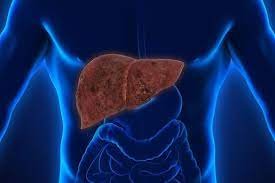
Fatty liver disease has emerged as a significant health concern worldwide, affecting millions of people of all ages. However, what many fail to realize is that fatty liver disease is not only a condition to be concerned about in itself but also a necessary precondition for the development of type 2 diabetes.

Let's Understand Fatty Liver Disease
Fatty liver disease, also known as hepatic steatosis, is characterized by fat accumulation in the liver cells. It is commonly divided into two types: alcoholic fatty liver disease (AFLD) and non-alcoholic fatty liver disease (NAFLD). AFLD is associated with excessive alcohol consumption, while NAFLD is prevalent among individuals who do not consume significant amounts of alcohol.
Did You Know?
A study published in the Journal of Hepatology (2016) found that individuals with NAFLD had a significantly higher risk of developing diabetes compared to those without NAFLD, even after adjusting for other risk factors such as obesity and metabolic syndrome.
Risk Factors for Fatty Liver Disease
- Obesity
- Sedentary lifestyle
- Poor diet
- Insulin resistance
- Type 2 diabetes mellitus
- Genetics
- Excessive alcohol consumption

It is important to note that while these risk factors increase the likelihood of developing fatty liver disease, not everyone with these risk factors will develop the condition. Additionally, non-alcoholic fatty liver disease (NAFLD) can also occur in individuals without these risk factors, highlighting the complex nature of the disease.
How is Fatty Liver Linked to Diabetes?
Insulin Resistance
One of the primary mechanisms connecting fatty liver disease and diabetes is insulin resistance. Insulin is a hormone responsible for regulating blood sugar levels. In fatty liver disease, excessive fat in the liver triggers inflammation and oxidative stress, leading to insulin resistance. As a result, the body's cells become less responsive to insulin, leading to elevated blood sugar levels and a greater risk of developing type 2 diabetes.
Inflammation and Cytokines
Fatty liver disease is often accompanied by low-grade chronic inflammation. Inflammatory molecules produced by the fatty liver can interfere with the normal functioning of insulin receptors and impair insulin's ability to regulate blood sugar effectively. This chronic inflammation also promotes the release of pro-inflammatory cytokines, which further exacerbate insulin resistance and contribute to the onset of diabetes.
Lipid Dysregulation
Fatty liver disease is frequently associated with dyslipidemia, an abnormal lipid profile characterized by elevated levels of triglycerides and low-density lipoprotein (LDL) cholesterol. Dyslipidemia not only contributes to the development of cardiovascular diseases but also plays a role in insulin resistance and the progression to diabetes. High levels of triglycerides and LDL cholesterol can impair insulin signaling pathways and disrupt glucose metabolism, increasing the risk of developing type 2 diabetes.
Prevention and Management Strategies
-
Healthy Diet: Adopting a balanced diet rich in fruits, vegetables, whole grains, and lean proteins can help prevent and manage fatty liver disease. Avoiding excessive consumption of processed foods, sugary beverages, and saturated fats is crucial.
-
Regular Exercise: Regular physical activity can help reduce liver fat and improve insulin sensitivity. Aim for at least 150 minutes of moderate-intensity weekly exercise, such as brisk walking, swimming, or cycling.
-
Weight Management: Maintaining a healthy weight is essential in preventing and managing fatty liver disease. Even a modest weight loss of 5-10% can significantly improve liver health and reduce the risk of developing diabetes.
- Alcohol Moderation: Limiting alcohol consumption is crucial, especially for individuals with AFLD. It is recommended to abstain from alcohol or consume it in moderation (up to one drink per day for women and two drinks per day for men.)

Conclusion
Fatty liver disease is a necessary pre-condition for the development of diabetes, playing a pivotal role in the progression of this chronic metabolic disorder. Understanding the link between these two conditions empowers us to take proactive steps to prevent and manage them effectively. By adopting a healthy lifestyle, including a balanced diet, regular exercise, weight management, and alcohol moderation, we can significantly reduce the risk of developing diabetes and promote overall liver health. Together, let us strive to prioritize our well-being and create a healthier future for ourselves and generations to come.
Frequently Asked Questions (FAQs)
1. Can fatty liver disease cause diabetes?
Yes, fatty liver disease can increase the risk of developing diabetes. Fatty liver disease, particularly non-alcoholic fatty liver disease (NAFLD), is strongly associated with insulin resistance, a condition in which the body's cells become less responsive to insulin. Insulin resistance can lead to elevated blood sugar levels and, over time, may progress to type 2 diabetes. The accumulation of fat in the liver triggers inflammation and oxidative stress, which further contribute to insulin resistance and the development of diabetes.
2. Is there a difference in the risk of diabetes between alcoholic fatty liver disease (AFLD) and non-alcoholic fatty liver disease (NAFLD)?
Both AFLD and NAFLD are associated with an increased risk of diabetes. AFLD, which is caused by excessive alcohol consumption, can lead to liver inflammation and damage, contributing to insulin resistance and diabetes. On the other hand, NAFLD, which is more prevalent and not directly linked to alcohol, is strongly associated with metabolic syndrome and obesity. NAFLD-related inflammation and insulin resistance play a significant role in the development of type 2 diabetes.
3. Can treating fatty liver disease help prevent or manage diabetes?
Treating and managing fatty liver disease can have a positive impact on preventing or managing diabetes. Lifestyle modifications, such as adopting a healthy diet, engaging in regular exercise, maintaining a healthy weight, and moderating alcohol consumption, can improve liver health, reduce liver fat accumulation, and enhance insulin sensitivity. These lifestyle changes can lower the risk of developing diabetes or help manage blood sugar levels in individuals with existing diabetes.
4. Can reversing fatty liver disease reverse diabetes as well?
While reversing fatty liver disease can improve insulin sensitivity and reduce the risk of developing diabetes, it does not guarantee a complete reversal of diabetes once it has developed. However, adopting a healthy lifestyle and effectively managing fatty liver disease can help control blood sugar levels and reduce the need for medication in individuals with diabetes. It is important to work closely with healthcare professionals to develop an individualized treatment plan that addresses fatty liver disease and diabetes.



.png)


